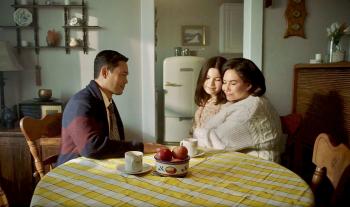Image Caption
Local Journalism Initiative Reporter
Windspeaker.com
After a limited theatrical release throughout Canada, award-winning Mohawk writer-director Shelley Niro’s latest film Café Daughter will be released to a wider audience through streaming and video-on-demand platforms May 7.
The film is an adaptation of Kenneth T Williams’ one woman play Café Daughter. While reading the play, Niro said she instantly felt connected with the main character, Yvette Wong, and wanted to protect her.
The play and film are based on the life of Chinese/Cree neuroscientist, scholar, feminist and retired Canadian senator, Lillian Eva Quan Dyck. Growing up in Saskatchewan in the 1960s, Dyck struggled against racism.
She aspired to become a doctor and healer but was held back in school despite her aptitude. She struggled too with her own identity, told by her mother, a residential school survivor from George Gordon First Nation, to not reveal her Cree ancestry for fear of discrimination.
Niro said it was an easy decision when she was approached by playwright Williams and Keith Lock, a Chinese-Canadian filmmaker and executive producer of Café Daughter, to make a film adaptation of the play.
“I was really honored to be asked to do a film version of the play,” Niro said.
Dyck “is an Indigenous woman who has gone through adversarial experiences, and she's had to conquer those on her own. She's managed to really come out on top of everything. And I think that she's such a great role model for anybody. I'm just happy to be able to take that story and do [a film] with it.”
While writing the script, Niro said she managed to get Dyck’s phone number and they talked at length about Dyck’s life. Through that conversation, Niro learned Dyck had a brother, Winston Quan, a detail not mentioned in the play.
“I contacted him as well and I had a nice long conversation with him. It was really friendly, really welcoming,” Niro said.
Because of the COVID-19 pandemic, Niro wasn’t able to meet with either Dyck or Quan in person, but said she felt invited into their story and was given the chance to see it in a personal way.
“If it wasn't for COVID, I think I would have gotten on a plane and gone down to meet with them. But I couldn't,” she said.
“They contributed information that wasn't in the play. And it is information that I put into the script when I was writing it.”
The sibling relationship is but one dimension Niro brought to her adaptation of the story, and an example of the challenges and opportunities that come with transforming theater into film.
“There are opportunities that you can bring in characters and have characters develop scenes that just make the film layered and interesting, not that the play wasn’t interesting, ” Niro said. “It just gives it a body and opportunities to work from.”
After seeing Café Daughter, Dyck said she sees it as a story of reconciliation, one that takes place on the individual personal level.
“Now that Canada is in a period of reconciliation, Café Daughter is the perfect story of one girl reclaiming her pride despite what was taught to her by the school system and the intergenerational shame she inherited from her Cree mother,” Niro said in a press statement for the film.
Starring Violah Beauvais as Yvette Wong, the cast also includes Sera-Lys McArthur, Star Slade, Tom Lim, Billy Merasty, Blair Lamora, Evan Lau, Julian Young, and Demaris Moon Walker.
Café Daughter premiered in September at the Cinéfest Sudbury International Film Festival and won the Audience Choice Feature Award at the 2023 imagineNATIVE Film + Media Arts Festival in Toronto.
Niro, a Bay of Quinte Mohawk member of Six Nations of the Grand River, has been recognized for her contributions to photography, visual arts and film throughout her 30-plus year career. In 2017 she was awarded the Canada Council for the Arts Governor General’s award in Visual Arts and was presented with the Paul de Hueck and Norman Walford Career Achievement Award from the Ontario Arts Foundation in 2020.
Even with the long list of accolades from eminent organizations, Niro said it is often still the reaction of her siblings she considers when working on her art.
Niro said her beginning as an artist came from trying to entertain her sisters and brother when they were young. In part, the jokes and stories were just a way to pass the time, yet in the sting of trying to make them laugh and their faces not cracking a smile, she was driven to push herself and improve.
“You tried really hard to be entertaining to be funny, to be all those things. And sometimes you're not,” she said.
“I think about that quite a bit. Not that there's pain involved, but I always imagine my sisters and brother sitting there and I am now doing this to entertain them. You know, they're kind of my first audience, even when I'm working on stuff now. Even if they don't see the work, or sometimes they don't understand the work, I just think that they're always my audience. My imaginary audience.”
Café Daughter will be found on iTunes/AppleTV, Bell on Demand, Shaw on Demand, Rogers on Demand, Google, Play/Youtube, Cineplex Store, and Amazon (VOD).
Local Journalism Initiative Reporters are supported by a financial contribution made by the Government of Canada.

